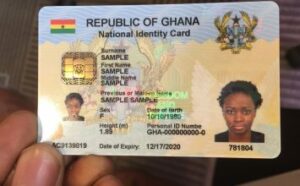Mass registration for NIA cards takes off smoothly
 Many residents of the Greater Accra Region, on Monday, turned up at the various registration centres of the National Identification Authority (NIA) to have their names recorded in the National Identity Register to be issued with the Ghana Card.
Many residents of the Greater Accra Region, on Monday, turned up at the various registration centres of the National Identification Authority (NIA) to have their names recorded in the National Identity Register to be issued with the Ghana Card.
The Monday to Saturday exercise, which would end on Saturday, July 6, would capture eligible Ghanaians from the age of 15.
When the Ghana News Agency visited the Ga South Municipal Centre at 0900 hours, the applicants had formed a long queue, patiently awaiting their turns. The elderly ones, however, occupied the chairs provided by the officials.
Some of the applicants, however, complained about the occasional breaks in the internet reception of the biometric machines as that slowed down the process.
This sometimes resulted in the registration process lasting about 20 minutes for an applicant.
Some of them, therefore, appealed to the NIA to increase the centres.
Others said they did not know how to acquire their digital address code and wanted more education to be able do that.
However, the general interaction with applicants across a number of centres indicated that many people were enthusiastic about getting the card, which would harmonize their information on other identity cards, and also serve as an ECOWAS passport.
An applicant must provide either a genuine birth certificate or a valid Ghanaian Passport; or a valid certificate of acquired citizenship, with a Ghana Post Digital Address Code.
Additionally, information on the applicant’s National Health Insurance Card, Voter Identification Card, Driver’s License and SSNIT Biometric Card are captured.
Applicants without birth certificates and passports are required to present a relative, who has been issued with the Ghana Card to vouch for them under an Oath.
Otherwise, two members of the community known to him or her, having the Card, and are either practicing or retired professionals can vouch for the applicants under Oath.
These must be a principal, a head teacher, a gazetted chief, a retired magistrate or a judge.
A medical doctor, a nurse, a lawyer and other prominent personalities in the society could also be a voucher.
The registration onto the electronic National Identity Register would integrate and harmonize existing identification registers to become the foremost source of identification system in Ghana.
It would also eliminate duplication of registers and the waste of national resources by other government agencies to upgrade their national information systems.
Consequently, Ghanaians both home and abroad would have a biometric verification service, while all user agencies, including the Bank of Ghana, Social Security and National Insurance Trust, National Health Insurance Authority and Ghana Revenue Authority could benefit from it.
Addressing a media conference in Accra, on Thursday, Professor Kenneth Agyemang Attafuah, the Executive Secretary of the NIA, said the exercise would be extended to the other regions, following its close in Greater Accra.
Volta and Oti regions would have their turns from July 15 to August 1; Northern, Savannah and North East regions – August 13 to September 2; while the Upper East and Upper West regions would have their turn from September 12 to 29.
Others are Bono, Bono East and Ahafo- October 10 – 30; Western Region and Western North – November 11 to December 2; Ashanti Region from December 10 to January 31, 2020.
The rest are Eastern Region – February 12- March 4; and Central Region – March 13-31.
The exercise starts at 0800 and ends at 1700 but public holidays are excluded.
Eighty-five per cent of Ghanaians are expected to be captured at the end of the exercise. Younger persons would be registered after the main exercise.
Source: GNA
